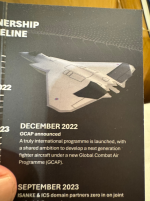Nice pop-corn party for the years to come : GCAP vs F-35. Choose your favorite.
UK: F-35B fighter purchase could be threatened by further budget cuts
Ayant pris ses fonctions de chef du gouvernement britannique le 5 juillet dernier, Keir Starmer n'a pas perdu temps : à peine deux semaines plus tard, il

www.opex360.com
Having taken office as head of the British government on July 5, Keir Starmer wasted no time: barely two weeks later, he entrusted George Roberston, a former Nato Secretary General, with the task of directing the work on a new defense strategy, whereas the current one had been published in March 2021 [and “adjusted” two years later, to take into account the effects of the war in Ukraine].
Clearly, it didn't take long for the first trial balloons to be launched. At the Farnborough Air Show, the British Minister for the Armed Forces, Luke Pollard, put a damper on the 6th generation fighter aircraft project to be developed as part of the GCAP [Global Combat Air Programme], in cooperation with Italy and Japan.
“This program is very important for us, and for our partners too. But I can't prejudge what might happen at the Defense [Strategic] Review,” said Pollard. He added: “We need cutting-edge capabilities, but we also need to make sure that when we buy ‘high-end’ systems, we do so in the most cost-effective way possible, which means working with our partners.”
This statement provoked some reactions, such as that of this Royal Air Force [RAF] official, who said that “investment in the GCAP will represent around a quarter of what we will invest in the Army's equipment procurement plan” over the next ten years. Justin Brook, a military aviation expert at the Royal United Services Institute [RUSI], took a sharper line. “GCAP will be impossible if there is a conflict in Europe in the next five years, because the world economy will have completely collapsed”.
Another sounding board was sounded on August 25. In its Sunday edition, the British newspaper The Telegraph relayed the concerns of several “defense industry sources” about the number of F-35B [short take-off and vertical landing] fighter-bombers that the RAF and Fleet Air Arm [the Royal Navy's embarked air force] will possess in the years to come.
These “sources” told the Telegraph that “there are growing concerns that the Ministry of Defence [MoD] may reduce the number of F-35Bs it needs to acquire, as it is already struggling to find the funds to finance those it has already committed to buy”.
To date, the UK has received 34 of the 48 F-35Bs already ordered. Initially, the plan was for London to acquire 138 aircraft of this type [114 for the RAF, 24 for the Fleet Air Arm].
However, the Strategic Defense Review published in 2021 remained vague about the final target, stating only that it would be “beyond” the first 48 F-35Bs ordered. A year later, the MoD announced that it had entered into negotiations with Lockheed-Martin to acquire a further 26 aircraft.
“The aim is to be able to field these new aircraft in the early part of the 2030s,” RAF Chief of Staff Air Chief Marshal Sir Richard Knighton told a parliamentary hearing at the time. He went on to say that a decision on the purchase of 64 more F-35Bs [to reach the target of 138 aircraft] would be taken “around 2025″... and that it would depend on GCAP developments.
2025 ? We're almost there... And no agreement on the purchase of the 26 F-35Bs [or even 27, to replace the one lost in the Mediterranean in 2021]has materialized yet.
Former head of the British Army, General Richard Dannatt, said it would be “madness” not to acquire more F-35Bs... after building two aircraft carriers capable of carrying at least 36 of them. Otherwise, he said, “the whole ‘Carrier Strike Group’ program could look like a white elephant”.
It has to be said that the British Army has seen its financial resources reduced... to finance the aircraft carriers HMS Queen Elizabeth and HMS Prince of Wales... So much for this not having been done in vain...
At a time when Mr. Starmer has predicted hard times for the British people after reporting a £22 billion budgetary “black hole” in the public accounts this year [“black hole” which he himself helped to create by authorizing £9 billion in new spending as soon as he arrived at 10 Downing Street], the Royal Air Force could find itself in a tricky situation... when it has already been established that its capabilities are insufficient to enable it to hold its own in a “high-intensity” engagement.
Soon, in addition to the F-35Bs it has received, the RAF will be down to 107 Eurofighter Typhoons out of its current 137, with 30 of the Tranche 1s due to be withdrawn from service for lack of upgrades. “This is like selling Spitfires before the Battle of Britain,” quipped a British MP last April.
Translated with DeepL.com (free version)










 The other ones i can speculate of something.
The other ones i can speculate of something.